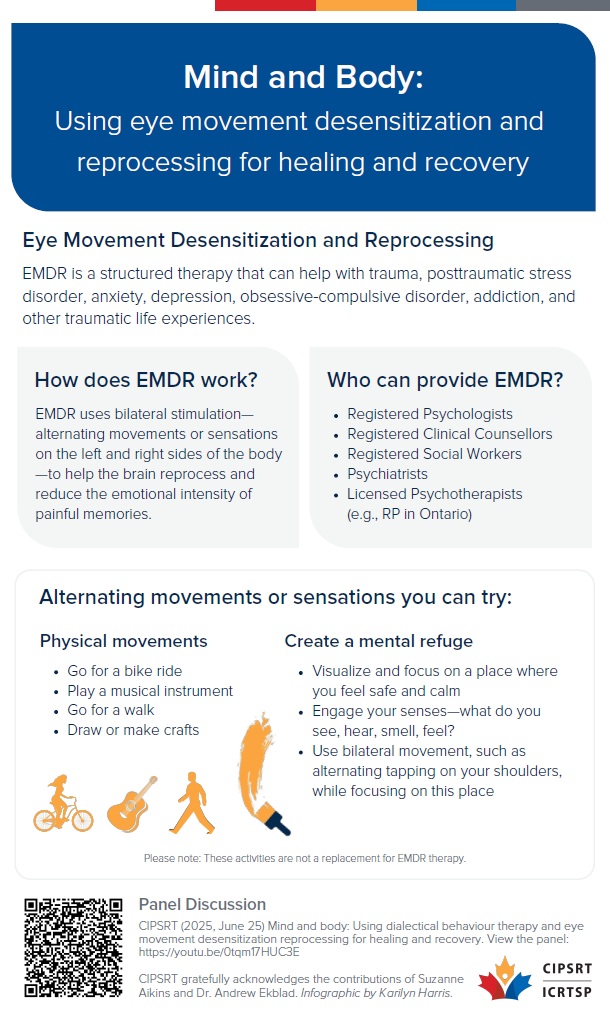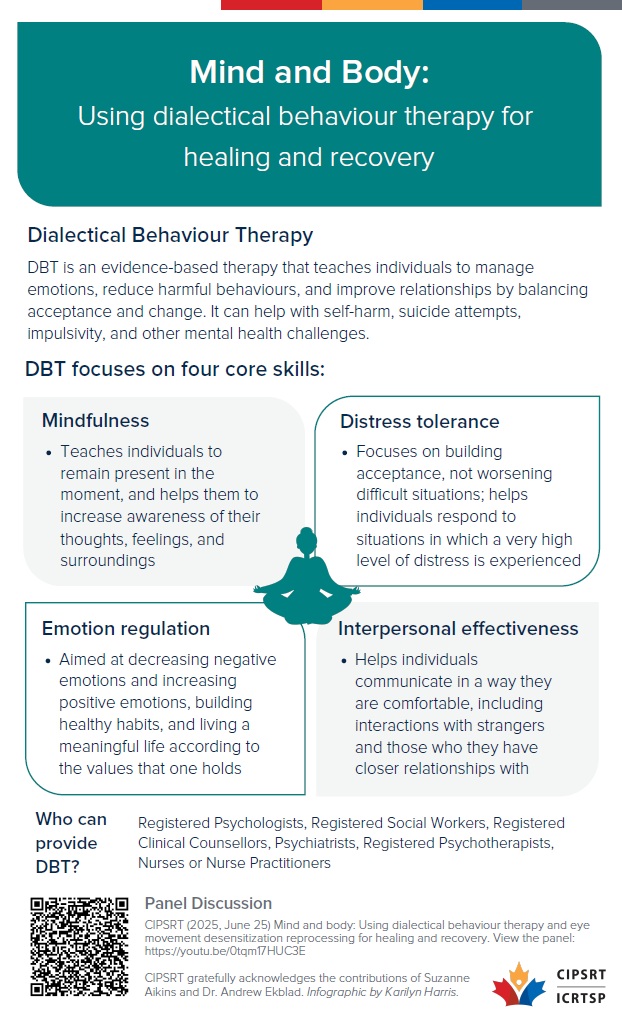Videos
Additional resources
What we learned
Objectives
Panelists discuss Eye Movement Desensitization and Reprocessing (EMDR) and Dialectical Behavioural Therapy (DBT), what EMDR and DBT consist of, and how both therapies are beneficial in trauma and mental health treatment. EMDR and DBT therapies are beneficial for public safety personnel (PSP) as PSP are frequently exposed to potentially traumatic and high stress events and these therapies can assist PSP in supporting their mental health.
Summary
EMDR:
EMDR consists of an eight-phase process focused on traumatic memories. Treatment phases include history taking and intake, preparation for the client, assessing the target memory, desensitization, installation, body scans for negative sensations, closure of session, and evaluation of results. EMDR uses bilateral stimulation, typically with sound or visuals, that alternate back and forth and stimulate both the right and left sides of the body. During the process of bilaterial stimulation, the traumatic memory is discussed and processed. Rather than targeting the symptoms, EMDR targets the traumatic memory. By processing the memory so the emotional associations surrounding the memory are reduced, the distressing symptoms it causes will naturally lessen.
DBT:
DBT focuses on regulating emotions through learned skills. DBT was designed to assist individuals who experience intense emotions to learn how to regulate themselves to a neutral emotional state. DBT works on the belief that emotional regulation skills can be taught, enabling individuals to manage emotions, behaviours, and relationships. DBT programs typically span 24 weeks and consist of both group and individual sessions.
Key Takeaways
- EMDR helps process traumatic memories
- By targeting the memory of a traumatic event with bilateral stimulation (like alternating sounds or visuals), EMDR reduces the emotional intensity of the memory, which can ease symptoms like anxiety, flashbacks, or hypervigilance.
- DBT teaches practical skills to manage intense emotions
- Through structured group and individual sessions, DBT builds skills in mindfulness, distress tolerance, emotional regulation, and healthy relationship strategies.
- Practice grounding techniques before and after trauma work
- Simple tools like deep breathing, focusing on your surroundings, or using a grounding object can help you feel more stable when processing difficult experiences.
- Mindfulness can be a daily habit, not just a therapy tool
- Short, intentional practice, like noticing your breath for one minute or doing a quick body scan, can improve resilience and help manage stress on or off the job.
- DBT skills are most effective when practiced regularly
- Don’t wait for a crisis! Build these skills into your daily routine so they’re easier to use when emotions run high.
- Know when to seek or recommend professional support
- If trauma symptoms persist or interfere with work, family, or sleep, connecting with a therapist trained in EMDR or DBT can be an important step toward recovery.
- Combine therapy with self-care
- Recovery works best when paired with good sleep, nutrition, physical activity, and strong social support.
About this discussion
This event took place June 25, 2025, and was presented by Suzanne Aikins, M.A., RP, OAMHP, EMDRIA (EMDRIA approved consultant and trainer), Dr. Andrew Ekblad, PhD, C.Psych. (Founder and Director of Broadleaf Health), and moderatated by Karilyn Harris, MEd (IP), MSc, BA Psyc (Knowledge Translator, CIPSRT).
Original event description:
Join us for a dynamic discussion exploring two powerful therapies in trauma and mental health treatment—Dialectical Behaviour Therapy (DBT) and Eye Movement Desensitization and Reprocessing (EMDR).
Our expert panel will share insights and practical strategies on how these modalities support healing from emotional dysregulation, PTSD, and complex trauma.
Whether you are a public safety personnel (PSP), PSP family member, clinician, student, or seeking to understand trauma therapy, this discussion offers valuable perspectives on how DBT and EMDR can help PSP and PSP families.

